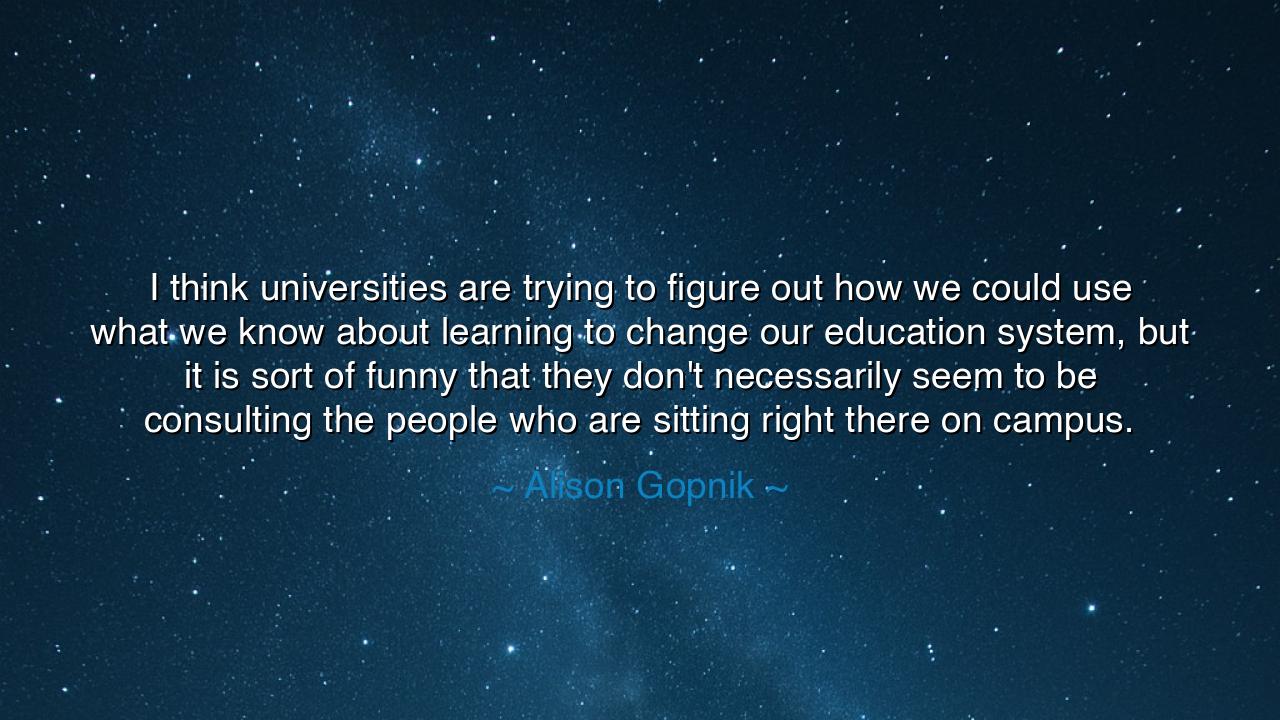
I think universities are trying to figure out how we could use
I think universities are trying to figure out how we could use what we know about learning to change our education system, but it is sort of funny that they don't necessarily seem to be consulting the people who are sitting right there on campus.






The scholar and philosopher of childhood, Alison Gopnik, once said: “I think universities are trying to figure out how we could use what we know about learning to change our education system, but it is sort of funny that they don’t necessarily seem to be consulting the people who are sitting right there on campus.” In her gentle irony lies a profound truth — a truth about wisdom, learning, and the blindness that often accompanies authority. Her words, though spoken in jest, are a mirror to every age and every institution that seeks progress while ignoring the very voices closest to its truth. It is the eternal paradox of knowledge: those who sit in towers of learning often forget to listen to the learners themselves.
When Gopnik speaks of universities “trying to figure out how we could use what we know about learning,” she touches upon the ancient dream of education — to shape minds with both art and science, to make learning not a burden but a liberation. Yet her observation that these same institutions “don’t necessarily seem to be consulting the people who are sitting right there” reveals a failure of humility. For who understands learning more intimately than the students, the ones who live it daily, who wrestle with confusion and wonder, who feel in their bones what makes knowledge awaken or wither? The irony she points out is not cruel, but human — a reminder that even the wisest often overlook the wisdom closest to them.
The ancients knew this blindness well. Socrates, the greatest teacher of Athens, claimed to know nothing. He did not speak at his students but questioned with them, believing that truth was not a gift handed down by authority but a fire kindled through dialogue. Yet the powerful men of his time, convinced of their own wisdom, silenced him. They could not see that the teacher who listens is wiser than the ruler who commands. And so it has ever been — the institutions that seek to teach the world often forget that the voice of the learner is the truest measure of what is worth knowing.
In Gopnik’s words, there is both humor and lament — humor, because the situation is absurd, and lament, because it is tragic. The very centers of knowledge — universities — strive to reform learning, yet forget to include the learners themselves. It is as if a farmer sought to improve the harvest but never asked the soil what it needed, or as if a physician studied healing without listening to the patient. In every age, progress falters when the wise speak only to one another, and not to those whom their wisdom is meant to serve. The disconnect between theory and experience is a timeless flaw in human design.
Consider the tale of the Library of Alexandria, that grand temple of knowledge in the ancient world. It gathered scholars from every land, yet few among them were practitioners of the common arts — farmers, builders, sailors, or storytellers. Its scrolls contained the knowledge of the mind, but not always the wisdom of the hands or heart. When fire consumed the library, it symbolized not only the loss of learning but also the arrogance of hoarded wisdom — knowledge too far removed from the people. Gopnik’s words echo across the centuries, calling us to avoid this same mistake: to remember that true education must flow between teacher and student, thinker and doer, theory and life.
Her insight also reveals a deeper truth about collaboration — that the boundaries between teacher and student, master and novice, must dissolve if learning is to evolve. The future of education, she implies, depends not on experts alone but on community — on shared curiosity, experimentation, and humility. Just as the child teaches the parent how to see the world anew, so must the student remind the institution what learning truly feels like: uncertain, alive, and filled with possibility. To learn well, we must first learn to listen — not upward, but around us.
The lesson, then, is this: the wisdom of any system lies not in its walls, but in its people. When you seek to build, to lead, or to teach, do not overlook those who walk beside you. Ask questions not only of the learned, but of the living. The mind that listens learns twice; the one that speaks without listening learns nothing. Education, whether in a grand university or in the quiet moments of daily life, must always be an exchange — a circle, not a hierarchy.
So, my child, remember Alison Gopnik’s gentle laughter at the irony of our age. It is a laughter filled with truth. Do not let your wisdom grow so high that it forgets its roots. When you wish to change a system, begin by listening to those within it. When you wish to understand learning, ask the learner. For the greatest teachers are not those who have all the answers, but those who know where to find them — in the voices, the experiences, and the hearts of others. In this humility lies the secret of all enduring wisdom — the wisdom that not only instructs the mind, but nourishes the soul.






AAdministratorAdministrator
Welcome, honored guests. Please leave a comment, we will respond soon